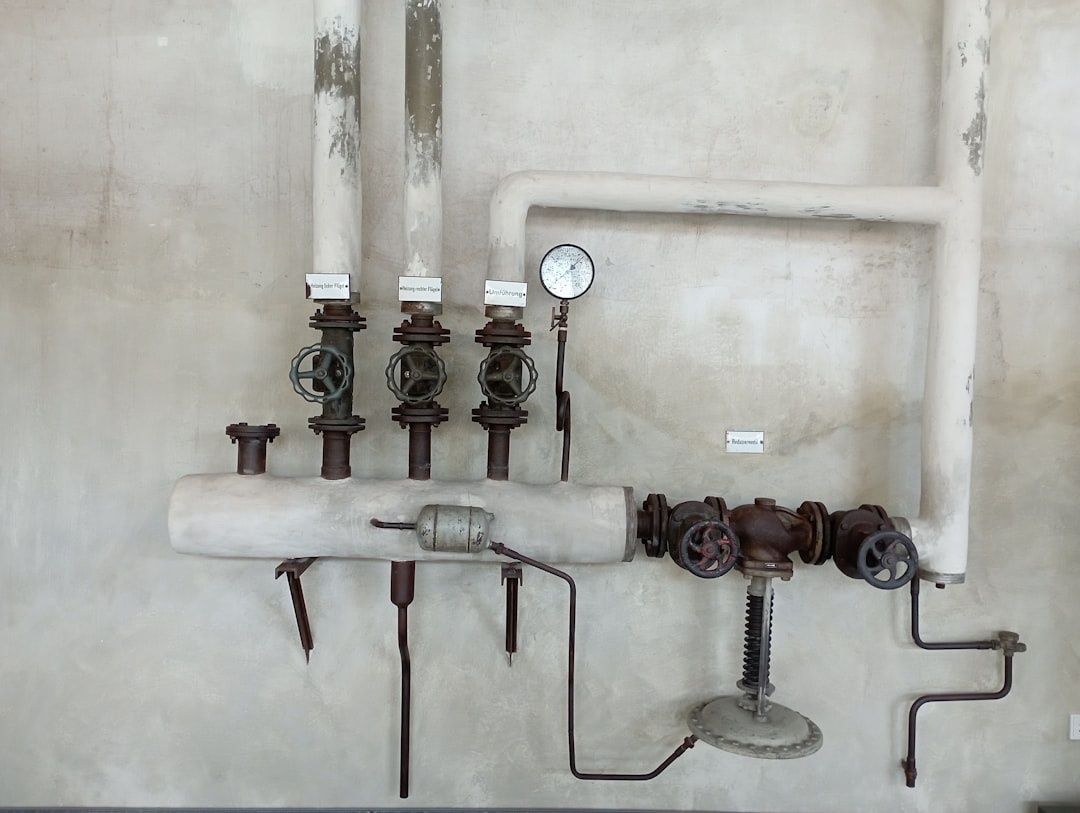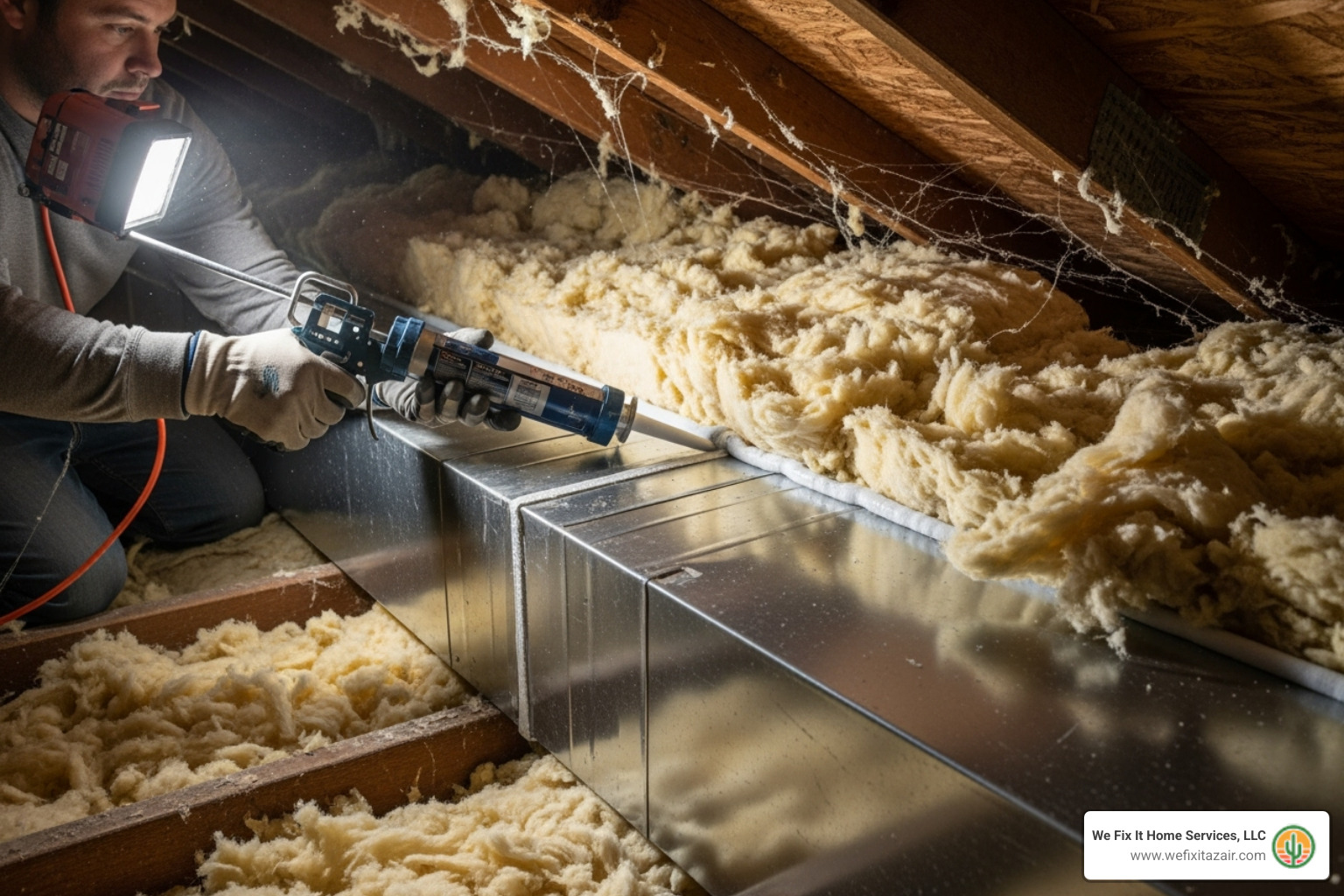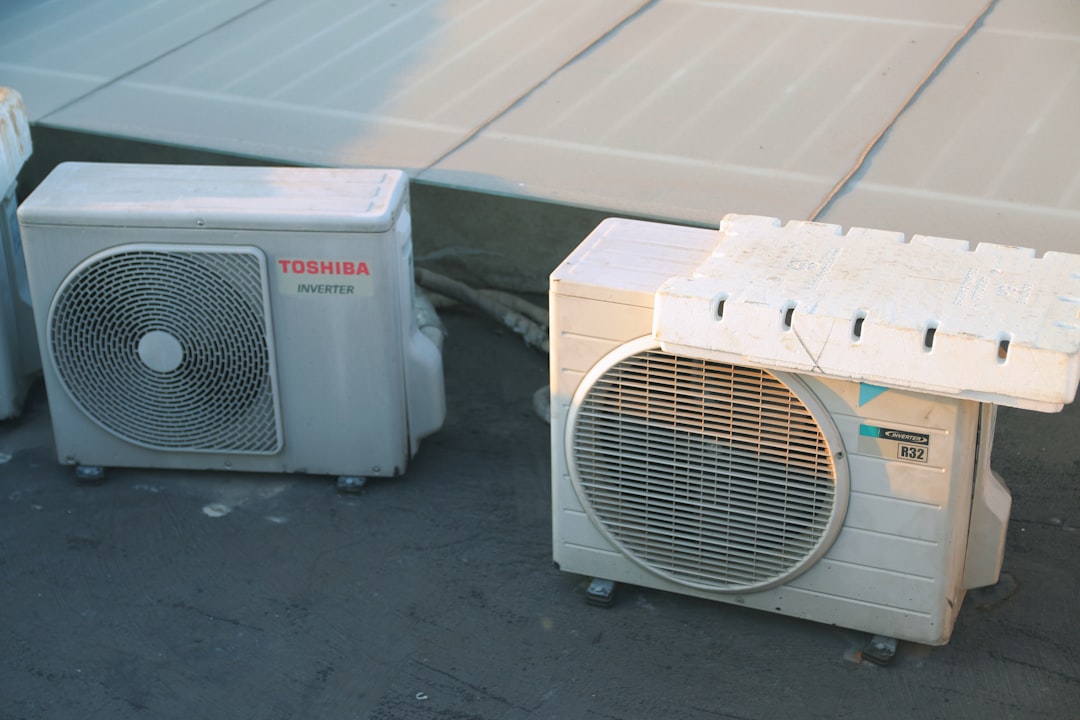Commercial HVAC Solutions: Keeping Your Business Cool, Calm, and Collected

Why Your Business Needs Reliable Mechanical HVAC Systems
Mechanical HVAC systems are the backbone of commercial building comfort, using engineered heating, ventilation, and air conditioning components to maintain optimal indoor environments for businesses. These systems control temperature, humidity, and air quality through complex networks of ducts, fans, coils, and controls.
What Mechanical HVAC Systems Do for Your Business:
- Temperature Control - Maintain consistent comfort levels throughout your building
- Air Quality Management - Filter pollutants and circulate fresh air for healthier workspaces
- Humidity Regulation - Prevent moisture problems that can damage equipment and inventory
- Energy Efficiency - Modern systems can reduce energy costs by up to 30% compared to older units
- Code Compliance - Meet building safety standards and ventilation requirements
When your mechanical HVAC system works properly, your employees stay productive, customers feel comfortable, and your energy bills stay manageable. But when it breaks down during Arizona's extreme heat, your business can grind to a halt.
The research shows that HVAC systems consume up to half of a building's energy usage. That's why choosing the right commercial system and maintaining it properly isn't just about comfort - it's about protecting your bottom line and keeping your business running smoothly year-round.
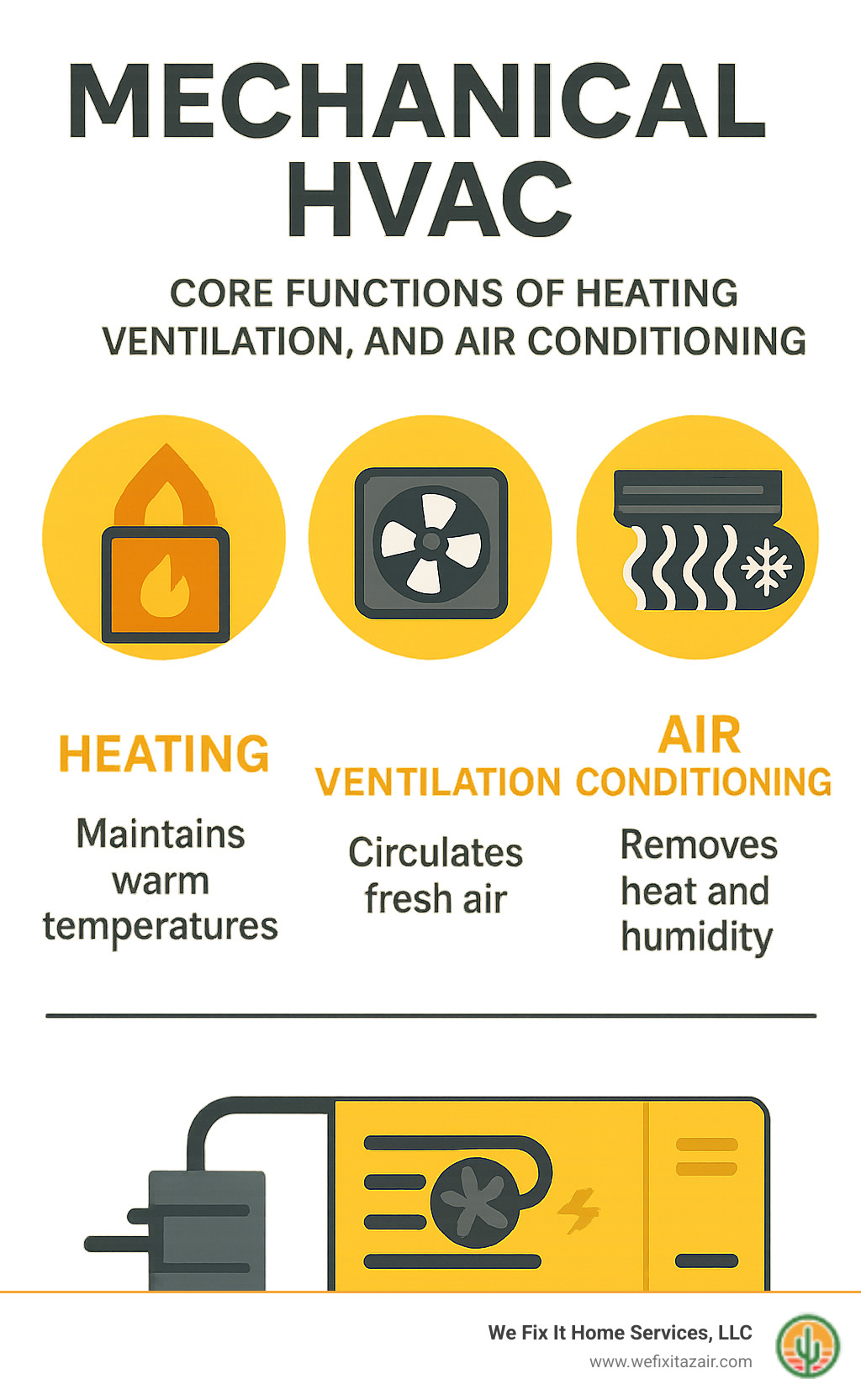
The Critical Role of Mechanical HVAC in Your Business
A perfectly comfortable office building with fresh air and the right temperature is no accident—it's the result of a well-designed mechanical HVAC system working behind the scenes.
In Arizona's climate, your commercial HVAC system does more than cool; it protects your investment, keeps employees productive, and ensures customers are comfortable. When these systems work, they're invisible. When they fail, business stops.
Energy efficiency is a critical business concern. HVAC systems can consume up to half of your building's energy, so modern mechanical HVAC systems with high SEER ratings can dramatically cut costs and reduce your carbon footprint.
Efficiency is also about building sustainability and meeting strict building codes. Today's businesses need systems that comply with safety standards while supporting occupant well-being.
The pandemic highlighted the importance of indoor air quality. Proper ventilation is essential for health, with the CDC recommending specific air change rates to reduce airborne risks. You can learn more about improving ventilation in buildings from their guidelines.
Effective temperature control is more than just cooling; it's maintaining consistent comfort across different zones and adapting to Arizona's weather swings.
Investing in quality mechanical HVAC solutions is an investment in business continuity, preventing shutdowns on hot days and keeping employees and customers happy.
Core Responsibilities of a Mechanical HVAC System
Every commercial mechanical HVAC system has five essential jobs that create the perfect indoor environment.
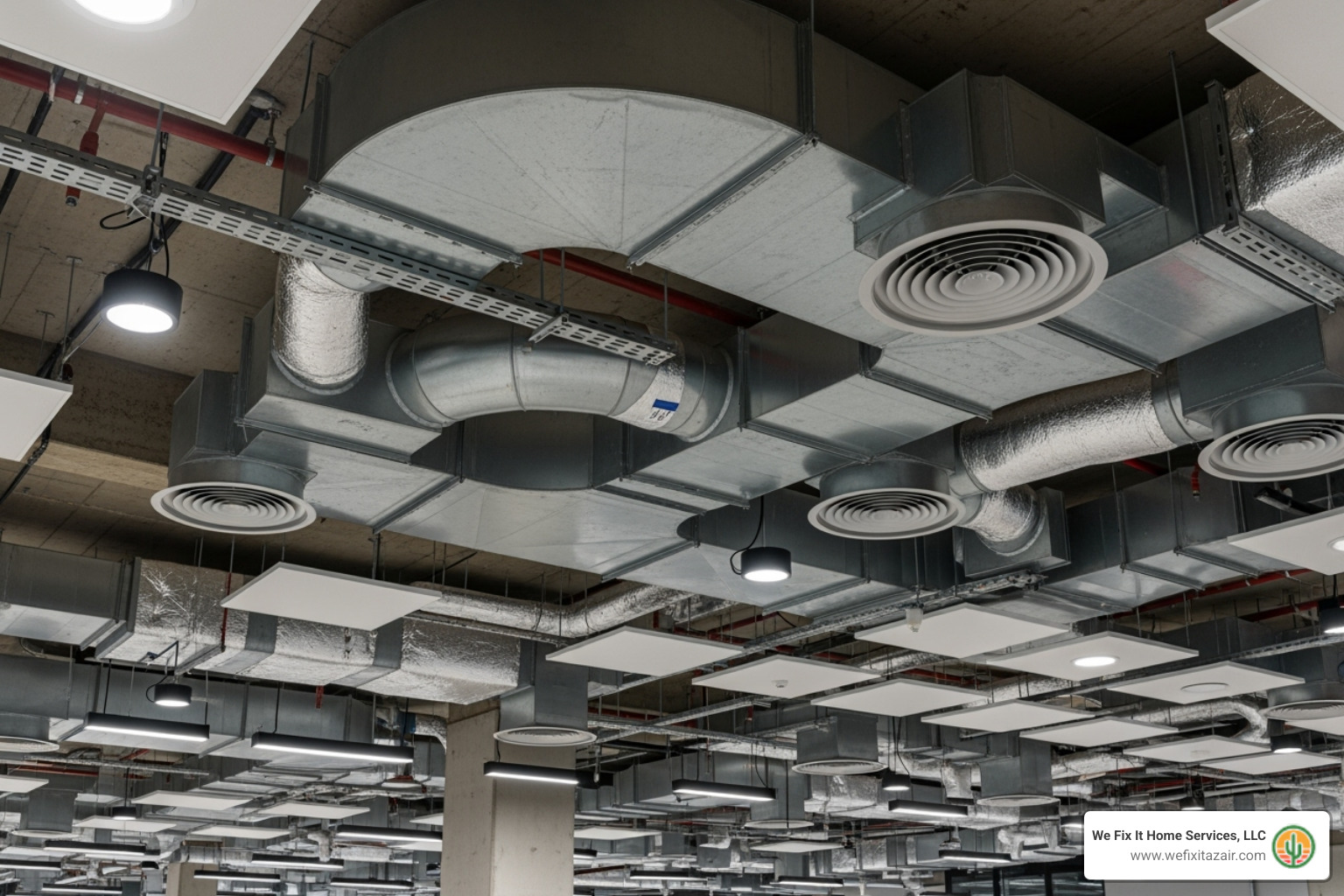
- Load calculations - This analysis determines the precise heating and cooling power your building needs based on size, insulation, windows, occupancy, and equipment. An incorrect calculation leads to an inefficiently oversized or undersized system.
- Air distribution - This network of ducts, fans, and vents delivers conditioned air. Poorly designed ductwork can waste up to 30% of your energy, making professional duct cleaning services and maintenance vital.
- Humidity control - In Arizona's climate, your system must manage humidity—removing excess moisture during humid periods and preventing over-drying in desert months. This protects inventory, prevents mold, and ensures comfort.
- Filtration - Commercial-grade filters capture dust, pollen, and bacteria, protecting both people and equipment. Clean filters are essential for efficient operation.
- Ventilation - This process exchanges stale indoor air with fresh outdoor air, diluting CO2, odors, and pollutants. Modern systems use demand-controlled ventilation to adjust airflow based on occupancy, saving energy while maintaining air quality.
Why Energy Efficiency and Sustainability Matter
Energy efficiency is essential for your profit margins. Since energy consumption is a large operating cost, every improvement helps your bottom line.
Modern mechanical HVAC systems with high SEER ratings pay for themselves through lower utility bills. Green technology like advanced heat pump systems provides both heating and cooling with exceptional efficiency.
Heat pump systems are perfect for Arizona's climate, transferring heat rather than generating it. Demand-controlled ventilation is another smart upgrade, adjusting airflow based on occupancy to save energy.
Investing in efficiency future-proofs your business against rising energy costs and new regulations. The cost savings compound annually, and sustainability credentials appeal to modern customers and employees.
Efficient mechanical HVAC systems make good business sense. When you're ready for upgrades or need help with indoor air quality (IAQ) solutions, our NATE-certified technicians can find the right balance of comfort and efficiency for your business.
Choosing the Right Commercial HVAC System
Choosing the right mechanical HVAC system is crucial. Unlike a bad pair of shoes, the wrong HVAC system hurts your wallet, employee productivity, and customer experience.
Key factors in system selection include:
- Building Size and Layout: A small office has different needs than a large warehouse. We consider square footage, ceiling height, zones, and special-use areas like server rooms.
- Business Needs: A quiet office requires precise temperature control, while a busy restaurant needs powerful ventilation and humidity control. Operating hours also influence system choice.
- Climate Considerations: In Arizona, your system must efficiently handle brutal summers and chilly winters to manage comfort and energy bills.
- Budget: We help you balance the upfront investment with long-term operational savings from high-efficiency systems.
- Installation Complexity: Factors like roof space, existing ductwork, and electrical access often determine the most practical system for your building.
Common Types of Commercial Systems
Commercial mechanical HVAC systems come in several types, each suited for different applications:
- Split Systems: Similar to residential units but scaled up, these are ideal for smaller commercial spaces like offices or retail shops requiring quiet operation and zone control. Our air conditioning services cover these versatile systems.
- Packaged Rooftop Units: These all-in-one units save indoor space and simplify maintenance. They are perfect for strip malls, standalone stores, and smaller office buildings.
- VRF/VRV Systems: (Variable Refrigerant Flow/Volume) One outdoor unit connects to multiple indoor units, each capable of heating or cooling independently. This allows for simultaneous heating and cooling in different zones, making it incredibly efficient and flexible. For smaller spaces, mini-split systems offer similar benefits.
- Chilled Water Systems: Best for very large buildings like hospitals or universities, these systems use a central chiller to pump cool water to air handlers, offering incredible efficiency for large-scale cooling.
System Design and Integration
Designing a commercial mechanical HVAC system requires every component to work in harmony. It's a complex process where engineering and coordination are key.
We start with a detailed engineering analysis and load calculations to determine precise heating and cooling needs. This design process involves close coordination with other professionals:
- Architectural Coordination: We work with architects to seamlessly integrate ductwork and equipment into the building's design.
- Structural Integration: Heavy equipment and ductwork require proper support, so we coordinate with structural engineers to ensure safety.
- Electrical Requirements: All components need dedicated power and control wiring, which we plan for safe and reliable operation.
- Plumbing Needs: Proper drainage for condensation and piping for chilled water systems are essential to prevent water damage.
We use specialized design software like AutoCAD and Building Information Modeling (BIM) to create 3D models and spot potential conflicts before construction begins. This detailed planning ensures an expert HVAC installation that starts with smart design.
Proactive Maintenance and Expert Service for Peak Performance
Your commercial mechanical HVAC system is like a high-performance car; it needs regular tune-ups to run smoothly. Proactive maintenance is key to keeping it at peak performance. Most business owners ignore their HVAC until it fails, leading to expensive emergency repairs and unhappy customers, especially during Arizona's brutal summers.
Regular maintenance provides significant benefits:
- System Longevity: A well-maintained system can last 15-20 years, while a neglected one may fail in half that time.
- Preventing Breakdowns: Our NATE-certified technicians spot warning signs early, like worn belts or low refrigerant, to prevent failures on the hottest days.
- Reducing Operational Costs: A clean, efficient system can cut energy costs by 10-15% or more, a significant saving since HVAC accounts for about half of a building's energy use.
Our NATE-certified technicians bring the expertise needed for every service call, backed by warranty protection and our comprehensive HVAC maintenance plans for year-round peace of mind.
Common Challenges in Mechanical HVAC and How to Solve Them
Even the best mechanical HVAC systems face challenges, but most have straightforward solutions.
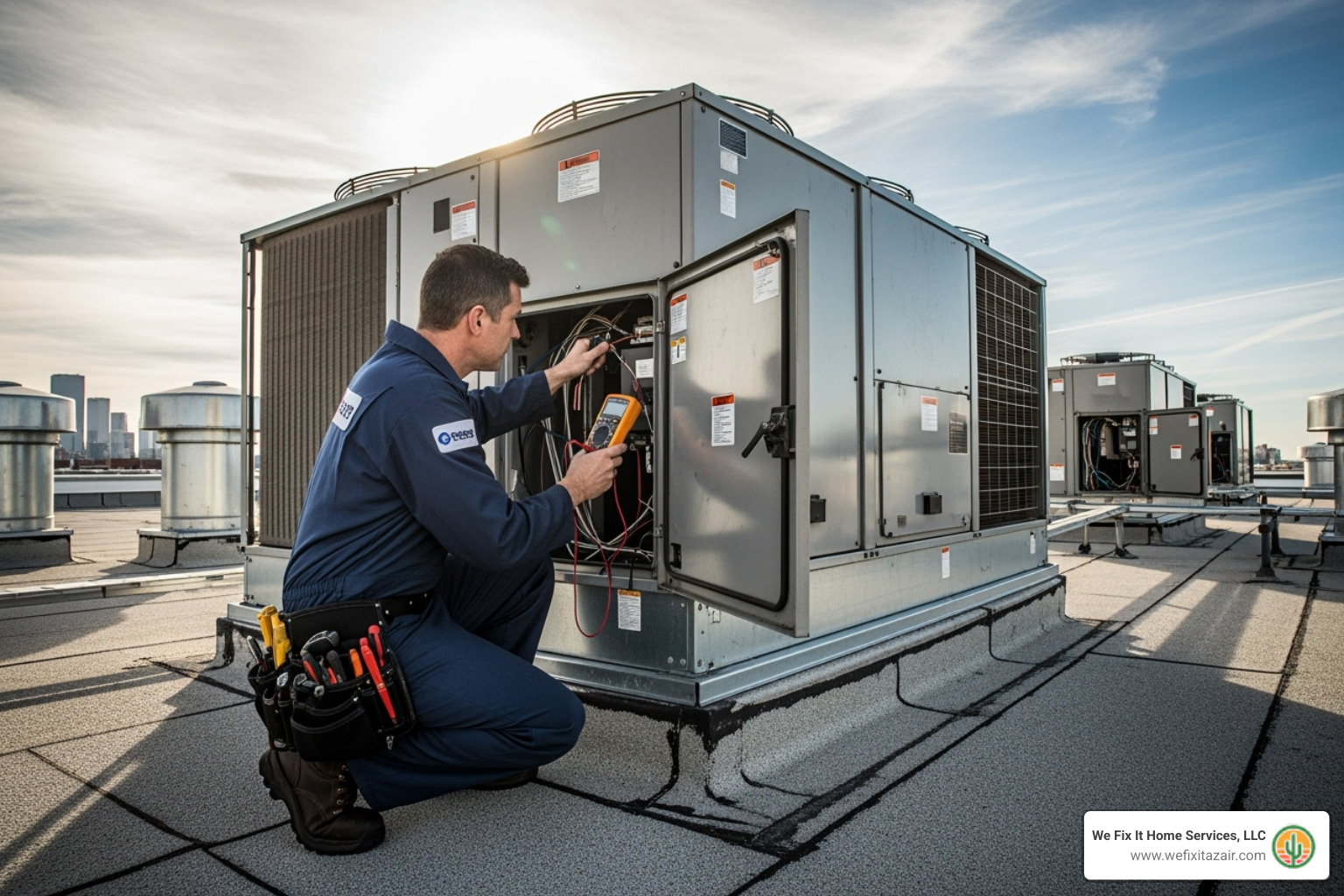
- Dirty Filters: This is the #1 cause of poor performance. Clogged filters force your system to work harder, increasing energy bills and risking damage. The solution is simple: check and replace filters regularly (monthly or quarterly).
- Refrigerant Leaks: If your building isn't cooling properly, a leak could be the cause. This requires professional repair, as handling refrigerant needs certification. Our technicians can locate and fix leaks, then recharge the system.
- Thermostat Malfunctions: Inconsistent temperatures or an unresponsive system may point to a thermostat issue. Check the basic settings first, but it may need professional recalibration or replacement.
- Uneven Cooling: This often indicates ductwork problems like leaks or blockages, a zoning issue, or an undersized system.
- Strange Noises: Sounds like grinding, banging, or hissing indicate problems with bearings, components, or refrigerant. Turn off the unit and call for professional HVAC repair immediately to avoid more expensive damage.
The Value of a Professional Maintenance Plan
A professional maintenance plan is a smart business investment that focuses on preventing breakdowns, not just fixing them.
Key benefits include:
- Scheduled Tune-ups: We recommend twice-yearly service (spring and fall) for comprehensive inspections. Our technicians clean components, check connections, lubricate parts, and verify proper operation.
- Priority Service: Plan members move to the front of the line for emergency service, which is critical during peak seasons.
- Discounted Repairs: Members receive significant discounts on parts and labor.
- Comprehensive Inspections: Routine visits catch small issues before they become major, costly problems.
- Energy Savings: A well-maintained system runs more efficiently, directly lowering your monthly energy bills.
- Compliance Checks: We ensure your system meets local building codes and safety standards.
Our heating services are also covered under our maintenance plans. A professional plan pays for itself through extended equipment life, improved efficiency, and peace of mind.
Frequently Asked Questions about Commercial HVAC
We understand that mechanical HVAC systems can be complex. Here are answers to the most common questions we hear from business owners.
How often should a commercial HVAC system be serviced?
The short answer is twice a year minimum, but several factors can change this. Most systems need professional service in the spring and fall to prepare for Arizona's seasonal demands. However, your specific needs depend on your business. A 24/7 facility or a building in a dusty location will need more frequent service and filter changes (monthly instead of quarterly).
Following manufacturer recommendations is also crucial to keep your warranty valid. More complex systems may benefit from quarterly inspections. During each visit, our technicians perform a thorough check-up, including coil cleaning and system diagnostics.
What are the main differences between residential and commercial HVAC systems?
Commercial systems are fundamentally different from residential ones for several key reasons:
- Size and Capacity: They are built to handle larger spaces and greater heat loads from people and equipment.
- Complexity: Commercial systems often feature multiple zones for independent temperature control and sophisticated automation.
- Placement: Most commercial systems are rooftop units to save indoor space and reduce noise.
- Drainage Systems: They have more robust drainage to handle larger amounts of condensation.
- Modular Design: Components can often be replaced or expanded individually.
- Maintenance Requirements: They require more intensive, specialized care due to longer run times and their critical role in business operations.
How can I improve my building's energy efficiency?
Improving energy efficiency saves money and helps the environment. Here are some effective strategies:
- Programmable Thermostats: Set them to reduce conditioning when the building is empty for immediate savings. Smart thermostats offer even greater efficiency by learning your usage patterns.
- Regular Maintenance: A clean, well-tuned system runs more efficiently. Dirty filters and coils force your system to work harder and consume more energy.
- Sealing Ductwork: Leaky ducts can waste up to 30% of your conditioned air. Proper sealing ensures that air gets where it's needed.
- Upgrading to High-SEER Units: If your system is over 10-15 years old, a modern high-efficiency unit can cut energy costs by up to 30%.
- Zoning Systems: These allow you to condition only the occupied areas of your building, preventing energy waste.
- Improve Indoor Air Quality: Solutions like whole home air purifiers can lead to better system efficiency by keeping components cleaner.
Many of these improvements pay for themselves through energy savings, making your building more comfortable and profitable.
Conclusion
Your business deserves more than just basic climate control—it needs a mechanical HVAC system that works tirelessly behind the scenes to keep everything running smoothly. Think about it: when your system is working perfectly, nobody notices. But when it breaks down during Arizona's scorching summer heat, suddenly everyone's talking about it (and probably not in a good way).
The truth is, system reliability directly impacts your business continuity. A failed HVAC system doesn't just make people uncomfortable—it can shut down operations, send customers running, and cost you thousands in lost revenue. That's why investing in the right system, proper installation, and ongoing maintenance isn't just smart business; it's essential for protecting your investment.
Your employees' comfort affects everything from productivity to job satisfaction. Studies show that uncomfortable temperatures can reduce work performance by up to 15%. When your team is comfortable, they're focused on what matters most: serving your customers and growing your business.
At We Fix It Home Services, we understand that every degree matters. As a family-owned HVAC company proudly serving Pinal and Maricopa Counties, we've built our reputation on delivering trusted AC, heating, and indoor air quality solutions to businesses just like yours. Whether you're in San Tan Valley, Chandler, Mesa, Gilbert, Phoenix, or Tempe, our NATE-certified technicians bring the expertise and dedication your business deserves.
We're not just another HVAC company—we're your neighbors, committed to keeping Arizona businesses comfortable year-round. Our comprehensive maintenance plans, extended warranties, and priority service mean you'll never be left out in the cold (or heat). From emergency repairs that get you back up and running fast to full system replacements that set you up for years of reliable service, we go above and beyond to provide the best care at the best prices—every time.
Don't wait until your mechanical HVAC system leaves you hanging. For comprehensive commercial HVAC solutions in Tempe, AZ, and surrounding areas, contact our team today. We're ready to help you create the perfect indoor environment that keeps your business thriving, no matter what Mother Nature throws your way.




















Customer Testimonials























